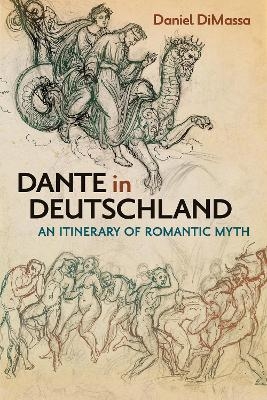
Dante in Deutschland
An Itinerary of Romantic Myth
Seiten
2022
Bucknell University Press,U.S. (Verlag)
978-1-68448-419-5 (ISBN)
Bucknell University Press,U.S. (Verlag)
978-1-68448-419-5 (ISBN)
Shows how Dante’s Divine Comedy shaped the development of German Romanticism. The book argues that the weight of Dante’s influence induced a Romantic preoccupation with authority: Who was authorized to create a mythology?
Around the turn of the nineteenth century, no task seemed more urgent to German Romantics than the creation of a new mythology. It would unite modern poets and grant them common ground, and bring philosophers and the Volk closer together. But what would a new mythology look like? Only one model sufficed, according to Friedrich Schlegel: Dante’s Divine Comedy. Through reading and juxtaposing canonical and obscure texts, Dante in Deutschland shows how Dante’s work shaped the development of German Romanticism; it argues, all the while, that the weight of Dante’s influence induced a Romantic preoccupation with authority: Who was authorized to create a mythology? This question—traced across texts by Schelling, Novalis, and Goethe—begets a Neo-Romantic fixation with Dantean authority in the mythic ventures of Gerhart Hauptmann, Rudolf Borchardt, and Stefan George. Only in Thomas Mann’s novels, DiMassa asserts, is the Romantics’ Dantean project ultimately demythologized.
Around the turn of the nineteenth century, no task seemed more urgent to German Romantics than the creation of a new mythology. It would unite modern poets and grant them common ground, and bring philosophers and the Volk closer together. But what would a new mythology look like? Only one model sufficed, according to Friedrich Schlegel: Dante’s Divine Comedy. Through reading and juxtaposing canonical and obscure texts, Dante in Deutschland shows how Dante’s work shaped the development of German Romanticism; it argues, all the while, that the weight of Dante’s influence induced a Romantic preoccupation with authority: Who was authorized to create a mythology? This question—traced across texts by Schelling, Novalis, and Goethe—begets a Neo-Romantic fixation with Dantean authority in the mythic ventures of Gerhart Hauptmann, Rudolf Borchardt, and Stefan George. Only in Thomas Mann’s novels, DiMassa asserts, is the Romantics’ Dantean project ultimately demythologized.
DANIEL DiMASSA is an assistant professor of German at Worcester Polytechnic Institute in Worcester, Massachusetts.
List of Figures
List of Abbreviations
A Note on Translation
Introduction: Orienting Romanticism
Part I: Romanticism
1. Discovering Dante and Theorizing Myth: The Schlegel Brothers and the Origins of the Romantic Project
2. Schelling, Novalis, and the Legitimation of a Dantean Mythology
3. Goethe’s Dantean Mythologies of the Self and of the World
Part II: Neo-Romanticism
4. Trespassing the Sign: The Mad Flight of Gerhart Hauptmann
5. Abolishing History: New Dantean Germanies in Rudolf Borchardt and Stefan George
6. Thomas Mann and the Demythologization of Dante
Conclusion
Acknowledgments
Notes
Bibliography
Index
| Erscheinungsdatum | 31.08.2022 |
|---|---|
| Zusatzinfo | 6 b&w images |
| Sprache | englisch |
| Maße | 152 x 229 mm |
| Gewicht | 458 g |
| Themenwelt | Geisteswissenschaften ► Philosophie |
| Geisteswissenschaften ► Sprach- / Literaturwissenschaft ► Anglistik / Amerikanistik | |
| Geisteswissenschaften ► Sprach- / Literaturwissenschaft ► Literaturgeschichte | |
| Geisteswissenschaften ► Sprach- / Literaturwissenschaft ► Literaturwissenschaft | |
| Sozialwissenschaften ► Soziologie | |
| ISBN-10 | 1-68448-419-7 / 1684484197 |
| ISBN-13 | 978-1-68448-419-5 / 9781684484195 |
| Zustand | Neuware |
| Informationen gemäß Produktsicherheitsverordnung (GPSR) | |
| Haben Sie eine Frage zum Produkt? |
Mehr entdecken
aus dem Bereich
aus dem Bereich
Poetik eines sozialen Urteils
Buch | Hardcover (2023)
De Gruyter (Verlag)
CHF 83,90
Buch | Softcover (2024)
belleville (Verlag)
CHF 27,95


